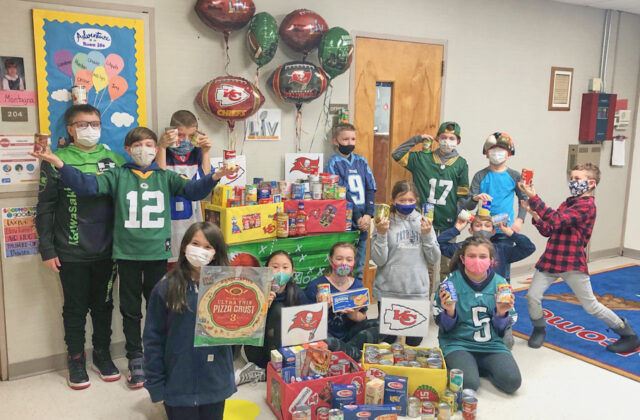Learning in the Time of Covid
Botelle staff and students have successfully readjusted to in-person classes
Text by Virginia Coleman-Prisco
Photo by Chris Snyder
Covid-19 isn’t the first pandemic to have an impact on public education in the United States. In the 20th century, Spanish flu, tuberculosis and polio outbreaks caused public schools to shift instructional methods to either “open air” or “remote learning.” In those days, remote learning was done over the radio, because that was the best technological option at the time. Last spring, when Botelle School transitioned to remote learning, technology such as Google Classroom and SeeSaw were the tools that made it possible.
Botelle returned to fully in-person learning in the fall. According to the Connecticut State Department of Education, only 6.7 percent of Connecticut schools have been able to achieve that model. The remaining schools break down as follows: 15.1 percent “mostly in person,” 41.8 percent “hybrid,” 18.4 percent “mostly remote” and 17.9 percent “fully remote.” Over the past seven months, Botelle staff and Norfolk families have worked together to keep the students safely in school. There have been a handful of Covid-19 cases, but by following the guidelines from the CDC and the Torrington Area Health Department, cases were quickly contained. No cases have been spread within the school community.
Botelle parent Hilary VanWright has been impressed with how the school administration and staff have worked with community members on plans for safely returning to in-person learning. Principal Lauren Valentino, too, is pleased that “Botelle students, families and staff have adjusted to the Covid requirements well. Students are resilient and flexible, and when the adults in their lives demonstrate a positive attitude, then they do too. Our staff is diligent in following the requirements. We all want to keep school open!”
The children have had to adjust to many new guidelines, such as wearing masks, social distancing and extra sanitizing. Pre-K parent Michelle Padua is grateful that her daughter’s first year of elementary education could happen in person. “She loves riding the bus,” Padua said, “and she loves the friends she’s made. She loves her instructors. She loves everything about Botelle. Having to wear masks and use ‘special soap’ upon arrival is nothing to a pre-K kid who has no prior experience in a school setting.”
Of course, happy and healthy children are important, but concerns about student performance are always at the forefront. Parents report via surveys and interviews that their children are performing “just the same,” “pretty on par,” and “not much different” in comparison to pre-Covid times. According to Valentino, “Overall, students are performing well. The school closure affected students in different ways. For our primary-aged learners, we notice some gaps in reading and early literacy skills. That’s not the case in the intermediate grades, where the gaps are in math. Teachers are adjusting their schedules to support ‘unfinished learning’ in those areas. We also are piloting a new math program along with the other elementary schools in the region. In a typical year, the implementation of a new curriculum resource results in slower pacing—that’s certainly been true in the middle of a pandemic.”
One way to know how students are performing is to administer assessments. According to Ajit Gopalakrishnan, the chief performance officer for the state’s Department of Education, “Though disruptions to learning due to the pandemic are continuing, it is vital that we reaffirm our commitment to equity and administer all statewide assessments during the 2020-21 school year. Having results in 2020-21 will allow us to monitor long-term trends and evaluate the full impact of the pandemic on student achievement and growth.”
This monitoring includes the Smarter Balanced Assessments, which Botelle administers to grades 3-6 toward the end of the school year. Botelle also has been giving the STAR assessments to students throughout the year. Although the STAR tests are not statewide, they do identify strengths and gaps for individual students in math and reading.
Yearly school-wide reports are usually presented to the Board of Education during the March or April meetings. At the February Board of Education meeting Lauren Valentino reported that Botelle has been scoring an average of 80 percent on reading, which board member and teacher Gordon Anderson lauded as “excellent.”
Spring also marks the budget season for Botelle and the Town of Norfolk. The Botelle Advisory Group has allowed members from the Boards of Education and Finance, the Economic Development Commission and the Norfolk Foundation to communicate throughout the year and address concerns, specifically regarding Covid-19 and the budget. On Feb. 16, the Board of Education voted to approve the proposed 2021-22 budget with a .67 percent increase from the 2020-21 budget.
This proposed budget will be presented to the Board of Finance on March 9. All Norfolk residents can virtually attend both the Board of Education and Board of Finance meetings. Links to the meetings can be found on Botelle’s and the Town of Norfolk’s websites. Norfolk residents need to know that the tax dollars used to support the Botelle School are going toward a safe and quality education for the town’s students, in a pandemic or not.

